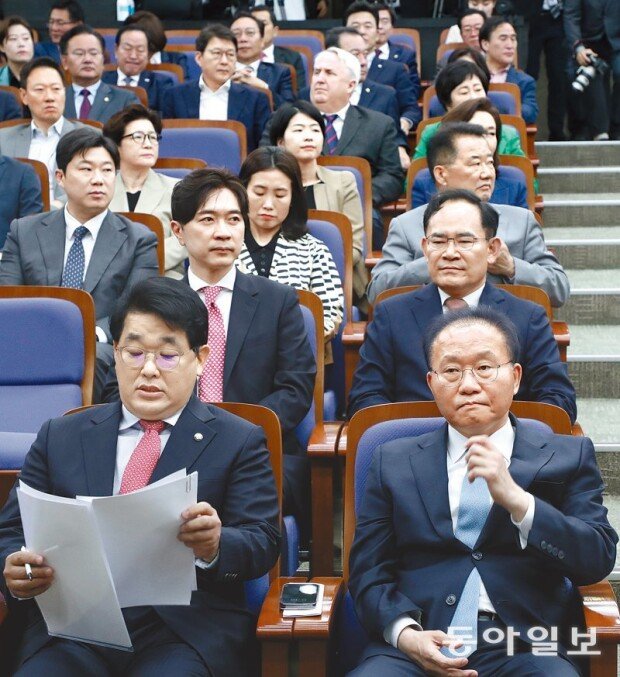Hwang Woo-yea nominated as PPP’s emergency response committee head
Hwang Woo-yea nominated as PPP’s emergency response committee head
Posted April. 30, 2024 07:50,
Updated April. 30, 2024 07:50

Regarding the nomination of Hwang Woo-yea, the former leader of the Saenuri Party, as the head of the People Power Party’s emergency response committee, many members of the party said it was a decision focusing on management after a series of rejections from the party’s prominent figures. Some criticized the decision as a choice far from a reform needed for the party after its devastating defeat in the April 10 general elections. There are mixed reactions as some have expectations that Hwang, who served in many key positions of parties, including a party leader, will be able to control the internal disputes within the party after its general election defeat, while others express concern that it was a decision made based on the pro-Yoon figures’ plan to appoint a senior figure without real power. Hwang left the political circles in 2016.
For the next two months, the nominee has tasks to resolve differences within the party regarding a party convention rule of 100 percent votes by party members and to demonstrate visible efforts for reform.
“We were looking for someone who can effectively manage the party convention, have good knowledge of the party and politics, and has moral influence and gain trust as a party leader,” Yun Jae-ok, the floor leader of the party, said regarding the nomination of Hwang. It was reported that Yun asked Hwang to take the position on Friday after a number of prominent figures of the party declined the offer.
Some party members say the nomination was based on the pro-Yoon figure’s thought that any senior member of the party could take the position as it is only for the party convention. However, a party member said it should be understood that Hwang granted a difficult request.
Hwang was a former judge who entered the political circles as a proportional representative of the New Korea Party in 1996. He served five terms as a lawmaker until the 19th National Assembly before he lost the 20th general elections and left the National Assembly, having been away from the political world for the past eight years while the name of the party changed three times from the Liberty Korea Party to the United Future Party and the People Power Party.
The first task facing Hwang is whether to revise a party convention rule that the convention is run 100 percent by votes of the members. Lawmakers from Gyeongsang Province and pro-Yoon figures argue that the current rule should be maintained, while those from Seoul and nearby regions and younger and more progressive members wish to reduce the share of party members and reflect public sentiments. “It is problematic for me to have a pre-conceived plan about changing the party convention rule,” Hwang said over the phone. “I would have deep conversations with a new floor leader once he or she is elected.”



![아침 공복 따뜻한 물 한 잔, 정말 살 빠지고 해독될까?[건강팩트체크]](https://dimg.donga.com/c/138/175/90/1/wps/NEWS/IMAGE/2026/03/05/133467930.3.jpg)



